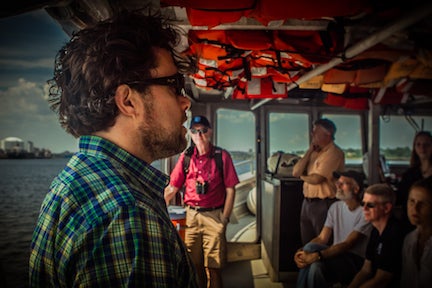
CI: Tell us a bit about a research project you are excited about right now?
AB: One project I am excited about is an integrated “virtual disaster impacts model.” This will bring together a range of impact models such as engineering models which measure damages to buildings, economic impacts on whole states and regions, and risk perceptions of managers—integrating them to produce outputs which people can more easily understand. These models can help stakeholders involved in coastal disaster situations, such as emergency responders who need to know what to expect when a storm is heading their way. What is most interesting to me, though, is how it will help planners better understand future impacts and plan for them decades in advance–integrating resilience into long-range land use plans.
CI: What about your work specifically at the Port of Providence climate resilience demonstration site; what would you say you are learning from work there?
AB: From this site, we have already learned that hurricane impacts and risks from major storms are not currently on the forefront of people’s minds. There has not been a major storm to hit that area since 1954. However, the level of risk since that time has actually increased due to development. Maritime infrastructure growth such as the building of petroleum storage and waste processing facilities has risen in the intervening decades. At this time it is not yet clear what role public and private parties each need to play, but there is consensus that work to enhance resilience at the port is needed. This shows us that we need to bring raise awareness among the various stakeholders about their risks and responsibilities concerning the port, something that integrated modeling can help to achieve.
CI: What would you say drew you to work in the field of marine affairs in the first place?
AB: Before becoming a marine affairs researcher, I was a tall ship captain on educational vessels for 10 years. In this position I interacted with ports in many parts of the world. Ports and harbors must serve the needs of multiple users simultaneously. For example, there are deep-water access requirements for commercial ports; ports need to be managed for environmental sensitivity since most are estuaries where an abundance of ecologically important marine life resides; the public also needs access to the waterfront for recreational uses, and so on. Into this dynamic environment you throw climate change and rising sea levels and the extremity of uses and the tensions between them that a manager must pay attention to becomes immensely complex. In marine affairs, we pay attention to these same tensions between users in coastal places. We look at such competing and cooperating forces as government policies, commercial shipping and fishing, and recreational use, etc., paying particular attention to the human dimensions of marine environments. The transition between captain and researcher, in this sense, was a natural one. I wanted to explore the tensions and their negotiation by the many competing users of ports and harbors in more depth which lead me to marine affairs.
CI: Now that we know about the public face of Dr. Becker—researcher and ship captain—tell us a fun and little known fact about yourself?
Besides the fact that my wife may be going into labor today with our first child?* (Laughs). Few people know that I am a long time runner. I have run in seven marathons, including the Boston marathon, though I won’t be able to run this year due to an injury. When I am not running, after a long day’s work, for fun I often reward myself by doing projects around the house—assembling bookshelves, installing light fixtures, etc. I suppose it is one of the things I miss about working on ships. You don’t get to complete things and see immediate results in the same way as an academic. As a captain you have to also play the role of electrician, plumber, carpenter, rigger, and more. You need to be able to perform these kinds of tasks and also to manage a team of mates and deckhands in order to deliver safe, high-quality, educational programs. I suppose that being a captain and a professor are similar in that both are interdisciplinary and both have a strong managerial component. You must wear many hats—hence as an academic we teach, research, serve on committees, contribute to national and international dialogues, etc. And both teaching and captaining involve managing teams to achieve complex goals—it’s what makes it possible as a researcher to work on as many projects as we do. At URI, I work with a team of students and research associates on multiple projects that simply would not be possible if I worked alone, just as on the ship my crew and I worked together to keep the ship sailing and the trainees trained!
*Dr. Becker is now the proud father of a baby girl.
